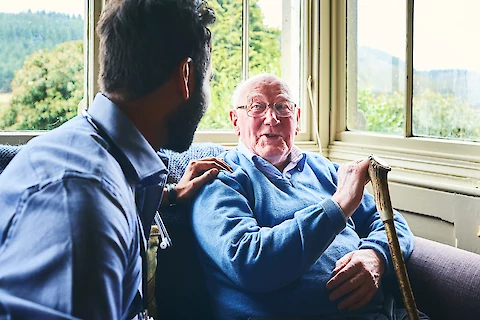
As an adult child of a senior with dementia, you may encounter new challenges, particularly the onset of sundowning. Sundowning, a common behavioral symptom in those with dementia, typically occurs around sunset, when increased agitation, anxiety, and confusion are visible. It's a complex and emotionally charged issue that can be a hard topic. However, beginning a dialogue about sundowning is essential to ensure your senior loved one gets the care they need and experiences less anxiety related to the changing seasons. This article has five tips for making the conversation about sundowning go smoothly and effectively.
1. Ensure You Understand Sundowning
Sundowning is a prevalent feature of dementia where seniors exhibit heightened confusion and agitation in the late afternoon or early evening. The causes and triggers may include fatigue, shadows, low light, and disrupted biological clocks. Your senior loved one might be more agitated or unable to sleep due to sundowning. However, before you can take steps to mitigate the effects of sundowning, you need to discuss the issue with your senior loved one so they feel a part of the decisions and necessary changes. Understanding these factors can help in effectively communicating about sundowning.
2. Be Prepared for the Conversation
Before having this important conversation, ensure you're well-informed about sundowning, its implications, and the senior's personal circumstances. The talk should occur in a calm, familiar environment free from distractions.
3. Initiate the Conversation
Starting the conversation can be delicate. Try to use an empathetic, patient, and understanding approach, relating to their experiences without causing fear or anxiety. The senior's reaction may vary from relief to denial; you must remain patient and reassuring.
4. Conduct the Conversation
When discussing sundowning, ensure your explanation is clear, simple, and devoid of medical jargon that could cause further confusion. Empathize with their situation, address their fears, and offer reassurance. You should discuss how sundowning affects their daily life and brainstorm ways to manage these challenges. Establishing a routine, limiting caffeine, and ensuring adequate lighting in the evening are aspects to consider.
5. Have a Post-Conversation Follow-Up
After your conversation, observe the senior's behavior and responses. You should follow up, note any changes, and adjust the care plan accordingly. If needed, do not hesitate to seek professional help. The well-being of your senior loved ones is a priority, and professional caregivers are ready to provide expert assistance.
Senior Helpers Fort Myers Cape Coral Helps Seniors With Sundowning Thrive
Talking about sundowning with your loved one can be challenging, but it helps you understand their experiences and ensure they receive appropriate care. If you're located in Fort Myers, Cape Coral, Fort Myers Beach, North Fort Myers, or Captiva and need assistance, don't hesitate to contact Senior Helpers Fort Myers Cape Coral. Our professional team is here to provide support and care during this challenging time.